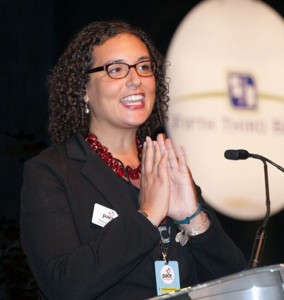Shana Brodnax
Girl Power!
 Shana grew up in an interracial family in Indianapolis, Indiana where she was one of a handful of students of color attending the magnet high school. She quickly learned that the most powerful differences between black and white kids were resources and access to opportunity. Shana’s family was rich in love and support; her parents repeated the message that she could do anything she wanted. She was motivated from an early age to give other young people the same strengths and convictions, no matter their color, no matter their gender.
Shana grew up in an interracial family in Indianapolis, Indiana where she was one of a handful of students of color attending the magnet high school. She quickly learned that the most powerful differences between black and white kids were resources and access to opportunity. Shana’s family was rich in love and support; her parents repeated the message that she could do anything she wanted. She was motivated from an early age to give other young people the same strengths and convictions, no matter their color, no matter their gender.
Outwardly confident, smart and poised, she nonetheless felt something was wrong with her as a high school student because she was black and a girl. (She learned later that there was absolutely nothing wrong with her!) Curious about inequities, she studied power dynamics at Indiana University and received a Bachelor of Arts in Afro-American Studies (with Honors) and Political Science and later earned a Master of Nonprofit Management at the New School. Shana dove into helping people in need with her first real job serving those affected by 9/11. She then spent three years with Catholic Charities in workforce development before joining Geoffrey Canada at the Harlem Children’s Zone (HCZ) where she oversaw early childhood and K-12 Programs.
In 2014 Shana left the Big Apple for the River City, Jacksonville, FL, to join PACE as the Chief Program Officer. Reporting to the CEO, Shana oversees 19 centers across the state serving 2,000 high school girls who are at risk of entering the juvenile justice system. Through counseling and education, PACE has changed the trajectory of thousands of lives. PACE aims to ensure girls feel more valued, safe and powerful. Shana is implementing a more data-driven model and has launched three new pilots to reach girls outside the centers. Because the program has been so successful, Shana is now strategizing to scale the model nationally, with Georgia as PACE’s first new state.
Shana and her partner Aniefre (Nef) get great parenting practice with the 2,000 PACE girls and look forward to applying the lessons learned to their own kids one day.
Q&A
- Where did you get your name?
My parents heard (and liked) my name on 60 Minutes, where Shana Alexander was a journalist featured in the “Point-Counterpoint” debate segment. She had also been the first woman columnist at Life Magazine and the first woman editor at McCall’s. - What did you want to be when you grew up?
I wanted to be a neonatologist, a doctor who treats newborn babies. I changed my mind when I realized what the reality and emotional toll of the job would be – that all the babies I saw would be very sick, and some of them would die in my care. - What do you want to be now?
I want to be a leader who changes the world. Idealist, yes, naive, maybe, but I do want that and I do still believe that changing the world is possible. I also want to be a great mom and part of an epic love story. - If you could have a mulligan, what would you redo?
Anytime I have unintentionally hurt someone I love. - What are you reading currently? Book or electronic app?
I’m reading A Walk in the Woods by Bill Bryson and Better than Before by Gretchen Rubin. I still love real books and check them out regularly from the library. - How many countries have you visited? Which would most happily return?
Seven. I always want to go back to Paris. - What is the biggest challenge ahead of you?
Motherhood and balancing it with the kind of work I want to do in the world. - Which living person do you most admire?
My mother. She had a terrible childhood, but she did not allow any of that into mine. She did the work she needed to do to heal her own wounds and not pass them on. - What is your greatest extravagance?
Travel. I love really nice hotels. - Which superpower would you most like to have?
Flight. - You’re invited to a state dinner at the White House and cannot take your spouse. Who is your date?
My brother. He is my oldest friend and still great company. - Assuming you had the talent, with what musical group/artist living or dead would you most like to perform?
Nina Simone.
